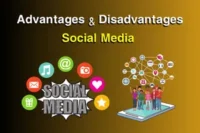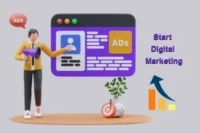What Are the Merits and Demerits of Social Media in Pakistan?
Published: 28 Jul 2025
Social media is a digital platform where people share ideas, news, photos, and videos in real time. In Pakistan, it has become a big part of everyday life. From students to everyone uses social media to stay connected, build careers, or share opinions. Apps like Facebook, WhatsApp, TikTok, and Instagram are now standard tools in every household.
Let’s explore the advantages and disadvantages of social media in Pakistan. Where youth, businesses, and even political voices depend on online platforms daily. In this blog, we will explore 10 major benefits and 10 serious drawbacks of social media use in Pakistan. This guide will help you understand both sides—how social media benefits us and how it can also misuse us.
What is Social Media?
Social media refers to a group of websites and apps that enable people to communicate, share, and connect with others online. In Pakistan, most people utilize platforms such as Facebook, WhatsApp, Instagram, TikTok, and YouTube to stay connected and receive updates. These platforms are now an integral part of our daily lives.
The growth of social media in Pakistan began around 2010, when the internet and smartphones became more widely accessible and affordable. Initially, only a few people used Facebook or Orkut. However, even people in small towns now use social networking sites to chat, post, and learn.
Do you know? Pakistan has over 71 million active social media users today. Most of them are between 18 and 30 years old. That means young people play a big role in making social media popular here. From school students to university youth, everyone is using apps to make reels, follow news, or even earn money online.
Let’s take a look at some popular platforms in Pakistan:
- Facebook – Still the most used app for posts, pages, and groups
- WhatsApp – Used for chatting and voice notes by almost every age group
- TikTok – Famous among youth for making short videos
- Instagram – Growing fast for photos, stories, and reels
- YouTube – Used for learning, vlogging, and entertainment
These platforms have transformed the way we communicate, shop, learn, and conduct business.
10 Advantages of Social Media in Pakistan
Social media is rapidly transforming lives in Pakistan in numerous positive ways. It’s not just about scrolling or chatting anymore. People now use it for learning, earning a living, and spreading awareness. Let’s look at 10 merits that are helping people in Pakistan grow socially.
1. Fast Communication Anytime, Anywhere
Social media has transformed the way people in Pakistan communicate. With apps like WhatsApp, Facebook, and Instagram, people can send messages, videos, and pictures within seconds. No matter where someone lives, in Lahore, Karachi, or a small village. They can stay connected with loved ones or business partners. This fast communication helps people keep in touch, share updates, and feel closer to each other.
Key Benefits:
- Stay connected with family and friends anytime
- Share information quickly
- Chat, call, or video call from anywhere
- Build personal and professional relationships easily
2. Learning & Digital Education Tools (e.g., YouTube, online courses)
Social media platforms like YouTube and Facebook offer free learning resources. Pakistani students utilize these platforms to view lectures and complete assignments. They explore new skills, such as graphic design or coding. Many people who cannot afford expensive courses are now learning online from the comfort of their own homes. Even teachers use social media to reach students across the country.
Key Benefits:
- Access free educational videos and tutorials
- Learn new skills from experts
- Take online courses without leaving home
- Use learning apps shared on social platforms
3. Business Promotion & Digital Marketing Growth
Today, many businesses in Pakistan utilize social media to promote their products. Now, anyone with a smartphone and internet can start a small business from home. From clothing to food delivery, digital marketing enables companies to expand their reach without a physical storefront. It also allows sellers to reach a wider audience across the country.
Key Benefits:
- Promote products or services online
- Reach more customers with less money
- Start a home-based business easily
- Use ads to grow faster
4. Awareness About Social and Health Issues
Social media plays a crucial role in spreading awareness about important topics, such as mental health, women’s rights, and climate change. During the COVID-19 pandemic, platforms helped share safety guidelines, vaccine updates, and medical advice. NGOs and social workers also utilize these platforms to connect with people and effect change in society.
Key Benefits:
- Spread information about health and safety
- Share important messages quickly
- Support social causes and campaigns
- Encourage healthy behavior in society
5. Job Opportunities Through LinkedIn & Facebook Groups
Many people in Pakistan find jobs through LinkedIn, Facebook, and WhatsApp groups. These platforms enable companies to post job openings and connect directly with potential applicants. Freelancers and fresh graduates often get their first jobs through social media networking. It’s easy, fast, and helpful—especially for people with limited resources.
Key Benefits:
- Find jobs without going to the office
- Join job-seeking groups and communities
- Connect directly with employers
- Build a professional profile online
6. Youth Engagement and Activism Platforms
Social media provides young people with a platform to raise their voices, share their opinions, and support causes they care about. Students run campaigns, participate in debates, and support social justice issues by using hashtags. It helps young people stay informed and play an active role in improving their country.
Key Benefits:
- Speak up about social or political issues
- Join youth-led campaigns
- Raise awareness using digital tools
- Stay connected with national or global movements
7. Access to News and Real-Time Updates
Gone are the days of waiting for the 9 PM news. Now, social media provides real-time updates about events happening in the country or around the world. It’s elections, floods, or cricket matches, Pakistanis can stay informed within minutes. You can follow news pages, journalists, and official accounts for updates.
Key Benefits:
- Get breaking news instantly
- Follow verified sources for accurate updates
- Stay updated on local and global events
- Share news with your network
8. Easy Connectivity with Friends & Family
Whether someone lives in another city or country, social media makes it easy to stay in touch with friends and family. Many Pakistanis have relatives working abroad. Through apps like Facebook Messenger and WhatsApp, they can talk or video call on a daily basis. This connection helps maintain strong family bonds.
Key Benefits:
- Talk to loved ones anytime
- Share photos and updates instantly
- Use free video and voice calls
- Stay emotionally connected with far-away relatives
9. Influence on Lifestyle and Fashion Trends
Pakistani youth follow influencers, vloggers, and celebrities on social media. These accounts introduce new fashion trends, makeup tutorials, or lifestyle habits. Many people find inspiration in their favorite content creators. This trend has also helped promote local fashion brands and startups.
Key Benefits:
- Stay updated with fashion and beauty tips
- Follow influencers for lifestyle inspiration
- Discover new brands and products
- Get ideas for home, food, and travel
10. Freedom of Speech and Self-Expression
Social media empowers every Pakistani to share their thoughts, creativity, and opinions freely. People write blogs, post videos, or share poems without needing a TV channel or newspaper. Many artists, poets, and writers have gained fame solely through their social media content.
Key Benefits:
- Express yourself freely
- Share art, poetry, or videos
- Connect with people who share your views
- Build your online community
10 Disadvantages of Social Media in Pakistan
While social media has many benefits, it also brings serious problems in Pakistan. From mental health to online safety, its misuse can harm people in many ways. Let’s explore the top 10 drawbacks of social media affecting users, especially young people.
1. Cyberbullying and Online Harassment
In Pakistan, cyberbullying is becoming a big problem, especially for girls and teenagers. Many young users face teasing, threats, or personal attacks on platforms like Facebook, Instagram, or TikTok. These attacks often lead to stress and a decline in self-confidence. In some cases, online bullying has even caused severe emotional damage. Girls are usually the primary targets, which creates fear and stops them from using digital spaces freely.
Key problems caused by cyberbullying:
- Emotional stress and anxiety
- Loss of confidence
- Unsafe online experience for girls
- Fear of using social media
- Increase in digital hate
2. Fake News & Misinformation Spread
WhatsApp is widely used in Pakistan, especially in rural areas. However, many people forward news without verifying its accuracy. This spreads fake news and false alerts, creating panic and confusion. Some fake news has even led to real-life fights or instilled fear in local communities. People often trust messages from friends or family without verifying them.
Risks of misinformation on WhatsApp:
- Panic during national issues or crises
- Confusion in elections or politics
- Rumors that hurt reputations
- Wrong medical tips or health myths
- Social division based on lies
3. Privacy Issues and Data Theft
Many social media users in Pakistan share their personal information online without knowing the risks. Hackers or scammers can misuse this data. Sometimes, apps even sell your data to other companies without your knowledge. A lack of awareness about privacy settings exacerbates the issue.
Privacy concerns include:
- Hacking of personal accounts
- Use of personal data by unknown apps
- Blackmail using private photos
- Stolen identities or impersonation
- Weak privacy laws
4. Addiction to Social Media Apps
Many young people in Pakistan spend excessive time scrolling through social media. This becomes an addiction. They repeatedly check apps like TikTok, Instagram, and Facebook—often without apparent reason. It affects their studies, sleep, and real-life social life. Addiction also leads to a lack of focus on tangible goals.
Common signs of addiction:
- Checking the phone first thing in the morning
- Spending 4–6 hours daily on social media
- Ignoring work or studies
- Feeling bored without using social apps
- Using social media even during meals or family time
5. Mental Health Issues Like Depression
Spending too much time on social media can make users feel lonely or sad. They see fake “perfect lives” of others and start comparing. This leads to depression, anxiety, or low self-esteem, especially among teenagers. Many people in Pakistan suffer silently due to this.
Mental health problems linked to social media:
- Feeling “not good enough”
- Comparing looks or success with others
- Online hate or body shaming
- Reduced real-life social interaction
- Fear of missing out (FOMO)
6. Time Waste and Procrastination
People often plan to use social media “just for 5 minutes,” but end up wasting hours. This leads to delays in work or studies. Essential tasks are ignored due to endless scrolling. Many students in Pakistan struggle to manage their time effectively due to this habit.
How social media wastes time:
- Unplanned scrolling for hours
- Watching non-educational videos
- Missing deadlines
- Disrupted sleep patterns
- Laziness and low productivity
7. Influence of Unethical Content
Many Pakistani youth follow trends that are not suitable or safe. TikTok trends often promote risky behavior, vulgar language, or disrespectful content. Young minds are easily influenced and tend to copy these trends without fully understanding their impact. This damages culture and personal values.
Effects of unethical content:
- Promotion of indecent fashion/language
- Copying dangerous stunts
- Disrespecting elders for fame
- Shortcuts to fame through the wrong ways
- Cultural damage and moral loss
8. Hate Speech, Online Fights, and Trolling
Social media platforms are often full of negative comments, hate speech, and trolling. People fight over religion, politics, or personal views. These fights increase social tension and hurt harmony. Many celebrities and public figures face daily trolling online.
Problems caused by online hate:
- Religious or political hate is spreading fast
- Cyber fights between groups or regions
- Trolling of students or creators
- Increase in online aggression
- Unsafe space for peaceful discussions
9. Academic Distraction for Students
Students in Pakistan often spend more time on YouTube, TikTok, or Instagram instead of focusing on their studies. This habit leads to low grades and a weak attention span. Many students check their phones even during classes or study time.
Academic issues caused by social media:
- Less time for study or homework
- Weak memory due to too much scrolling
- Multitasking reduces focus
- Poor exam performance
- Delay in learning or assignments
10. Scams, Fraud, and Fake Profiles
There are many fake accounts on Facebook and Instagram pretending to be someone else. Some accounts offer fake job opportunities or sell counterfeit products. Many users, especially women or the elderly, become victims of scams or online fraud in Pakistan. People lose money or personal data.
Common types of online scams:
- Fake online stores or products
- Job offers that ask for money
- Romance or friendship scams
- Identity theft through fake profiles
- Scamming through gift or lottery messages
Importance of Social Media in Pakistan
Social media has become a strong communication tool in Pakistan. It connects people from big cities to small towns in just seconds. If you are in Lahore or a village in Balochistan, platforms like Facebook and TikTok are now part of daily life.
In education, students use YouTube for learning and WhatsApp for group discussions. Teachers also share notes and class updates through social apps. This has made learning more flexible, particularly after the COVID-19 pandemic.
Small businesses are now utilizing social media to drive growth. A woman selling clothes from her home in Karachi can reach buyers across Pakistan using the media. Now, anyone with a smartphone and internet can start a small business from home.
For young people, social media is more than just fun—it builds essential skills. Many young people in Pakistan earn a living by freelancing, vlogging, or engaging in digital marketing. TikTok and YouTube help them share their talents and earn income.
Politics has also changed. Leaders now use Twitter and Facebook to talk directly with the public. Political trends, campaigns, and debates often begin online before reaching TV screens.
Suggestions for Schools, Parents & Government
Social media can help if we guide its use in the right direction. But without guidance, it can cause harm, especially to students and young users. Here are some easy-to-follow suggestions for schools, parents, and the government in Pakistan:
For Schools
Schools must teach digital awareness as part of daily learning. Teachers can show students how to use YouTube, Wikipedia, and Google for homework or school projects. When students learn to search smartly, they gain confidence and build fundamental skills.
For Parents
Parents should guide their kids, not just scold them. Many children spend hours on social media, but parents don’t know what they are doing. Sit with your child once a week. Ask what apps they use. Discuss online friends just as you would school friends.
For the Government
The government must take more decisive action against online crimes. Many people in Pakistan don’t know their rights when someone harasses them online. That’s why laws on cybercrime in Pakistan should be made public.
Conclusion
Social media in Pakistan has both merits and demerits. On one hand, it connects people, supports learning, and creates job chances. On the other hand, it can waste time, spread false news, and harm mental health.
That’s why a balanced use is essential. Don’t overuse it, and always think before sharing or believing anything online.
Final Tip: Social media is a powerful tool — it depends on how wisely we use it.
Frequently Asked Questions
1. What are the advantages and disadvantages of social media in Pakistan?
Social media helps connect people, share ideas, and grow businesses. But it also spreads fake news, causes addiction, and privacy issues. Using it with care and time limits can solve many of these problems.
2. What are the 10 benefits and 10 drawbacks of using social media?
Benefits include easy communication, learning opportunities, job prospects, and digital marketing. Drawbacks include time wasted, cyberbullying, a lack of focus on studies, and fake content. Using social media smartly and safely can reduce most drawbacks.
3. Why is social media important for youth in Pakistan?
It gives youth access to learning, global trends, and creative platforms. Many students and freelancers use it for career growth. However, they must strike a balance between usage and real-life goals.
4. What are the five disadvantages of social media?
It causes screen addiction, mental stress, fake comparisons, cyberbullying, and a lack of privacy. These can affect health and studies. Setting boundaries can help avoid these issues.
5. Is social media safe to use in Pakistan?
Yes, it is safe if you follow privacy rules and avoid risky content. Pakistan also has laws in place to protect users from cybercrime. Stay alert, use strong passwords, and report abuse when needed.

- Be Respectful
- Stay Relevant
- Stay Positive
- True Feedback
- Encourage Discussion
- Avoid Spamming
- No Fake News
- Don't Copy-Paste
- No Personal Attacks

- Be Respectful
- Stay Relevant
- Stay Positive
- True Feedback
- Encourage Discussion
- Avoid Spamming
- No Fake News
- Don't Copy-Paste
- No Personal Attacks





